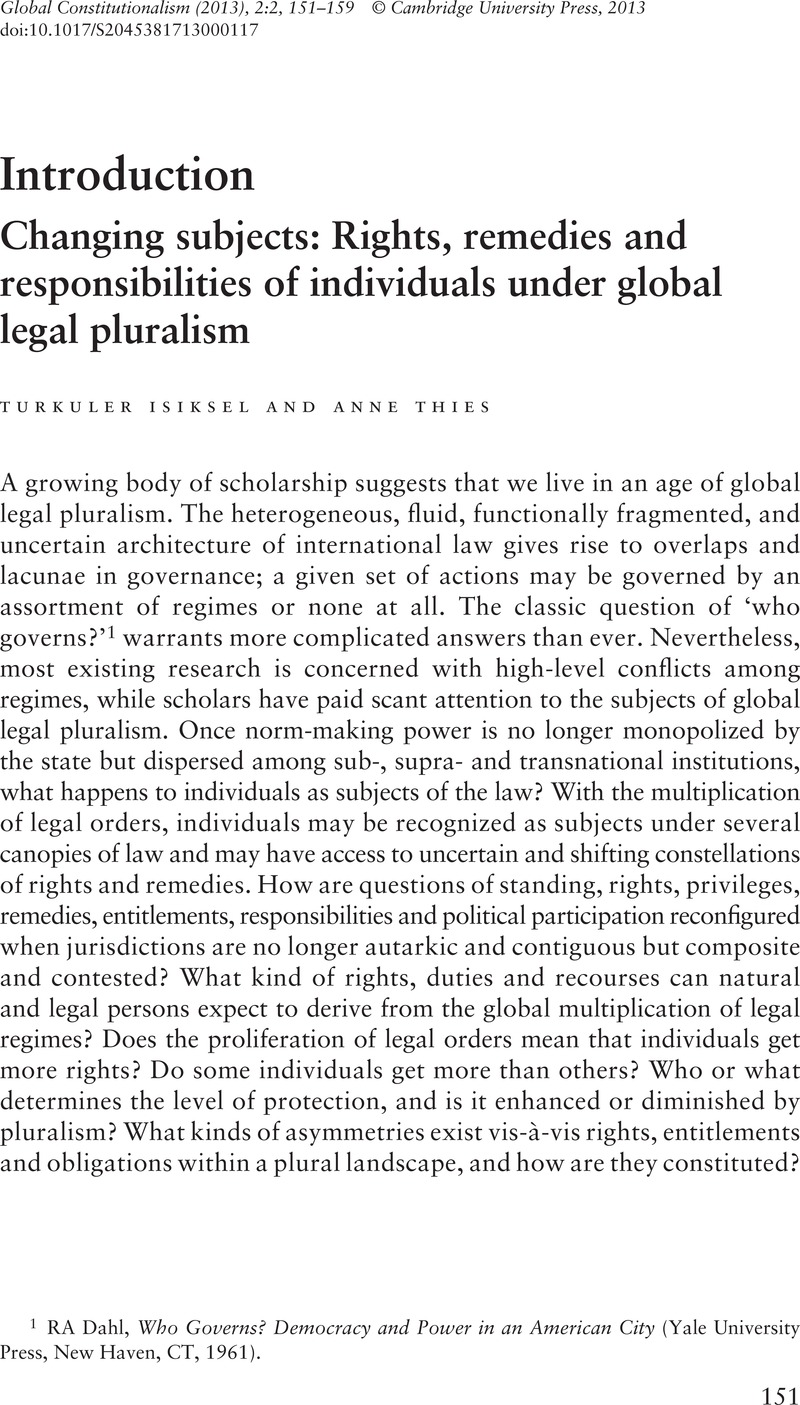Published online by Cambridge University Press: 28 June 2013

1 Dahl, RA, Who Governs? Democracy and Power in an American City (Yale University Press, New Haven, CT, 1961).Google Scholar
2 Hersch Lauterpacht is one of the earliest and most strident advocates of the idea that international law is coming to recognize ‘the individual as a subject of the law of nations’. See especially Lauterpacht, H, International Law and Human Rights (Archon Books, Hamden, CT, 1968 [1950]) 4; also, ch 2.Google Scholar
3 Maduro, MP, We the Court: The European Court of Justice and the European Economic Constitution (Hart Publishing, Oxford, 1998) 9.Google Scholar
4 A modest sampling of such works includes Charnovitz, S, ‘Two Centuries of Participation: NGOs and International Governance’ (1997) 18 Michigan Journal of International Law 183, 268–70Google Scholar; Isiksel, T, ‘Citizens of a New Agora: Postnational Citizenship and International Economic Institutions’ in Maas, W (ed), Multilevel Citizenship (University of Pennsylvania Press, Philadelphia, PA, 2013)Google Scholar; Peters, A, ‘Membership in the Global Constitutional Community’ in Klabbers, J, Peters, A and Ulfstein, G, The Constitutionalization of International Law (Oxford University Press, Oxford, 2009)Google Scholar; Sassen, S, Losing Control? Sovereignty in an Age of Globalization (Columbia University Press, New York, 1996), esp ch 2Google Scholar; Sassen, S, Territory, Authority, and Rights: From Medieval to Global Assemblages (Princeton University Press, Princeton, NJ, 2006)Google Scholar; Scholte, JA (ed), Building Global Democracy? Civil Society and Accountable Global Governance (Cambridge University Press, Cambridge, 2011)Google Scholar; O’Brien, R, Goetz, AM, Scholte, JA and Williams, M, Contesting Global Governance: Multilateral Economic Institutions and Global Social Movements (Cambridge University Press, Cambridge, 2000)CrossRefGoogle Scholar; Santos, BDS and Rodríguez-Garavito, CA (eds), Law and Globalization from Below: Towards a Cosmopolitan Legality (Cambridge University Press, New York, 2005)Google Scholar; Spiro, PJ, ‘New Global Potentates: Nongovernmental Organizations and the “Unregulated” Marketplace’ (1996) 18 Cardozo Law Review 957Google Scholar; Willetts, P (ed), ‘The Conscience of the World’: The Influence of Non-Governmental Organizations in the UN System (Brookings Institution, Washington, DC, 1996).Google Scholar
5 Wiener, A, Lang, AF Jr, Tully, J, Maduro, MP and Kumm, M, ‘Global Constitutionalism: Human Rights, Democracy and the Rule of Law’ (2012) 1 Global Constitutionalism 1, 1.Google Scholar
6 De Wet, E and Vidmar, J (eds), Hierarchy in International Law: The Place of Human Rights (Oxford University Press, Oxford, 2012).Google Scholar
7 The phrase is borrowed from J Resnik, ‘Law’s Migration’ (2006) 115 Yale Law Journal and cited in PS Berman, ‘Global Legal Pluralism’ (2007) 80 Southern California Law Review 1155, 1210.
8 With reference to Wiener et al. (n 5).
9 For an antecedent debate on ‘linkages’ between different policy objectives sought by international institutions, see the Symposium in 19 University of Pennsylvania Journal of International Economic Law (1998); see also Leebron, DW, ‘Linkages’ (2002) 96 American Journal of International Law 5.Google Scholar
10 G Shaffer, ‘Developing Country Use of the WTO Dispute Settlement System: Why It Matters, the Barriers Posed’ (2009) University of Minnesota Law School Legal Studies Research Paper Series, No 08-50, 171–5.